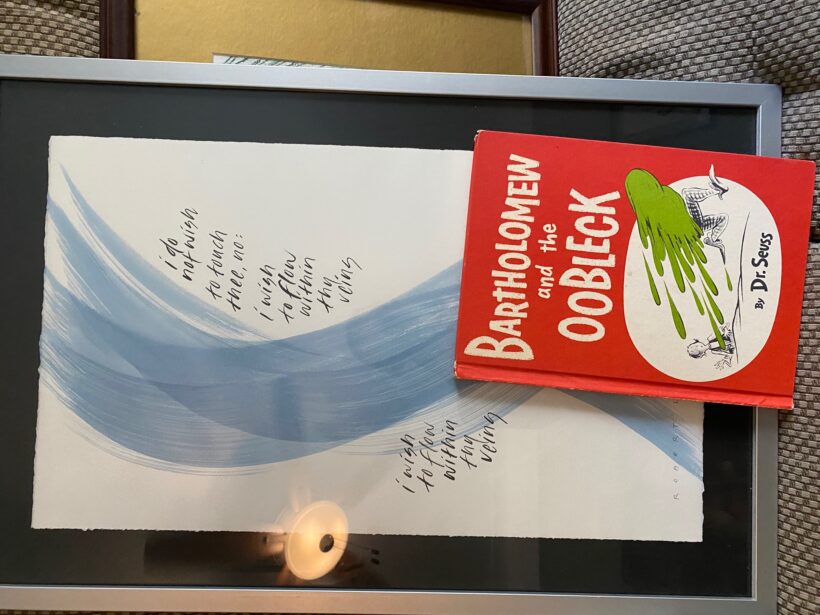The Common App just emailed you on August 1st, didn't they. A bajillion notifications. Even though everyone warned you, you now really get the sense you have 1,000 essays to write. You do! Sort of. Don't let the notifications stress you out. Just think of the Common App pings as little waves from your future, OK? Don't get your semi-colons and SAT words in a bunch. You got this. Here's a pep talk just for you. (I decided to go with the hot mess look so you know I'm just a person saying a thing. If link doesn't work, send me a message!) Already in need of writing momentum or guidance? (Aren't we all?) We have both plus good jokes. Listen, you need flow in your personal essay writing, not Oobleck in your face. Flow, not oobleck. Continue Reading …
writer's block
I promise you don’t have “Nothing To Write About”
A common complaint: "I Have Nothing to Write About!" One of the most common things I hear from students at the beginning of the school application process is “I have nothing to write about!” Parents and professionals tell me all the time they get this response when students must answer personal questions about themselves. And as a parent or professional, you know your kid or student is brimming with great ideas, yet when they sit down to write, they produce-- nothing. You remind them what's special about them, but “I have nothing to write about!” they complain. And they probably (think they) mean it. I've been there too. Good news for students: it's really unlikely! You made it this far in life, you definitely have something to write about, you’re just not convinced you do. That usually means it’s just too hard to get started, you feel insecure, you’ve convinced yourself your ideas are poor in advance, or you aren’t thinking specifically enough. The best way to cut through the obstacle, whatever the reason, is just to start! Below I share my favorite tips for doing so. Try them all until something works, because something will. Continue Reading …
What if I don’t have something to write about?
This is a thing I hear a lot: I don't have something to write about. Franklyn said it. Erin said it. Fatou said it. You might have said it. It's not true. And your admissions essay writing process should prove that to you. Are your cells not dividing, just because you can't see it happening from your current vantage point? No: in so far as we know, we are always breaking something down in order to grow. So there is always a bitty thing leading to a bigger thing. That's writing: the power of the specific and small to expose something more. You do have something to write about: you can write about anything. Choose smaller Often, the students that show up for my help carting their Big Something to write about end up having to switch gears and pick a new topic. They were trying to impress, not investigate. They need to get really small. The orange rind they left in their backpack in third grade, that started their interest in problems mold can cause. The way their mom's tamales smelled on Sunday mornings, that led to family competition who could eat theirs the slowest. The time they missed the bus and found a dying baby bird. These things are small. They are not often things we call Something. The best writing begins with anything. Sometimes, it's better that you write beginning with something random, not loaded, so you feel more free to explore: "paperclip"; "backwash"; "pothole"; "queasy." Our minds are so good at making up stories-- and so you feed your mind a word, it often spits out a situation, a scene, a reflection. Follow that, open the boring-looking door, get nosy. Find or make a pattern with your thinking We are pattern detecting machines; but we are also pattern generating machines. When I ask students to make a connection or association in their personal essay writing, the a-ha's, I'm really asking them to find the pattern, and if they can't find one, make one. Is it true that Orion's belt is just hanging out in the Continue Reading …
Power of mixing
When stakes are high in writing (like, say, is true for the college essay) we can forget how much joy there is in mixing unlikely things together. This is a form of play young children know well, and shed reluctantly. Only after enough adults have said, "You can't do X with Y!" a la "You can't put a POTATO on the TRAIN TRACK!" does the kid eventually "get it" = the adult world is full of arbitrary rules, and really missing out on the power of mixing up. We need our poets to keep our language lively This morning, the power of mixing tackled me from the first lines of Terence Hayes's poem "When James Baldwin & Audre Lorde each lend Stevie Wonder an eyeball/ he immediately contends with gravity, falling either to his knees/or flat on His luminous face." I mean, lend an eyeball? Thanks, guys. We know right away we're in the presence of a player. In mixing surprise with pragmatism, absurdity with serious verbs (lend...contends...falling), Terence says: get in on this, it's going to be good. I'm not going to give you what you expect, because you don't want me to. And did you notice the rock stars in my poem? Be the kind of player who mixes meanings Speaking of players; There were plenty of the other kind of player in my high school and college (both elite institutions, GULP!), the sort who slept with girls and then thought nothing of ranking those experiences on a scale of crap to Cardi B the next morning in public lounges. The only reason those guys were fun to be around was the same reason anyone wound up the topic of their conversation: they kept it light, everything, even themselves, was a joke. I mention them because they were mean: but the player of words is not mean, though perhaps slicing. The poet players are truth-chasers. When Terence plays, we have to play along. The poem is full of nouns, and potential white-people repellent. Nods at lyrics and artistic endeavors, "inner visions" of Wonder are now populated (purpled!) with Continue Reading …
Feeling Stuck? Move!
Stuck really sucks Do you ever just feel stuck? Literally? On the page, in your head, with that stupid crank in your neck? Twinge in your tight back? If you said no, never been stuck, you're amazing, and also the exception. You should come over and tell me all your secrets, which I can afterward try to pass off in a blog post as my own. (Just kidding, but you will obviously be on Oprah before then!) Thing is: Most of us, most of the time, feel more stuck than not. And the way to deal with that is so simple it's like asking how you should end your sentences (with a period!): MOVE. That's right, move. My friend and colleague Ruthie Fraser wrote this gorgeous little book about that: Stack Your Bones: 100 simple lessons for realigning your body and moving with ease. Here's more on that. Each exercise has broad applicability; each encourages movement to be natural, but with clear energetic goals and room for improvisation. So "Vary Your Route" begins, "Come to your hands and knees. Lengthen your spine. Extend your elbows." These cues might be familiar if you've ever done yoga. However, she encourages us to start with the familiar, and shift to novel shapes. "Habitual movements create habitual thinking. Feel your mind open as your body travels new routes." She offers simple exercises-- but profound, like a period is profound! One little dot indicating both an end and a beginning!-- that can be utilized at any time, as a foundation for however you prefer to move or exercise. They can also be used in stillness, as a computer break when working on, say, your college essay, or some other writing project that begs for nourishing interruption. She hopes we can all feel firsthand in our bodies what unstuck could be like. And perhaps it will help you align your ideas a little more clearly with your intentions. Or introduce some wildness into bland sentences. Speaking of wildness...speaking of moving... I recently listened to an amazing Continue Reading …
Begin your college essay anywhere
How to begin writing your college essay? Sometimes it feels harder than bench pressing 3x your weight. Sometimes it feels harder than plucking hairs with your non-dominant hand. Sometimes it feels harder than spelling French words correctly. But it doesn't have to. Faced with the challenge of how to begin, just begin. That is, go around the challenge by refusing to see it as a challenge. Overwrite the fear, inertia, or blank feeling by starting right there, using it as your prompt. Freewrite from this moment Caffeinate yourself until you see double, turn down the sound of babies crying and your neighbor's weird fetish for Frank Sinatra, turn down the sound of siblings having the same old fight, parents barking, friends texting....and start there. I mean, you could start with any of the things listed above, the particulars of your life. Or you could start with the emotion-- or lack of emotion-- that facing an essay brings up. For example, you might set a timer, take a few deep breaths and start: "At this moment, I am staring at the page, well aware that what I put on this page is supposed to be super talented, attractive, and make me sound as Good as Friday. To handle this amount of pressure and anxiety, I am on my third Starbucks Peppermint Latte, which I got with my last dollar for the week, and now I add to my list of crappy things that I might not be able to sleep for a month from the amount of stimulant coursing through my blood, and I notice all the other people working nearby-- I'm in the library-- and that they all seem to be typing freely and easily, so I have to believe they are updating their social media accounts, not writing an application essay. I just noticed that is the longest sentence ever..." Will you win the Pulitzer for this content? Likely not, but if you do, please mention that this blog helped you get going. That said, who cares? The way you get over not knowing where to begin is by Continue Reading …





